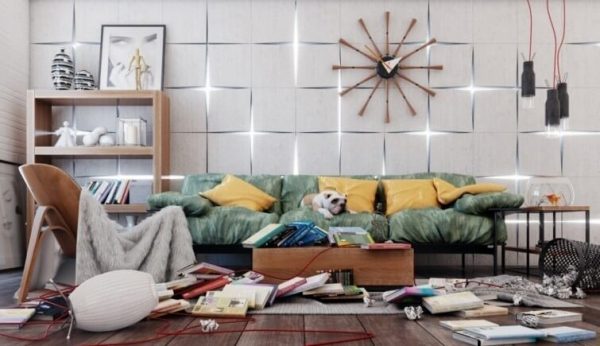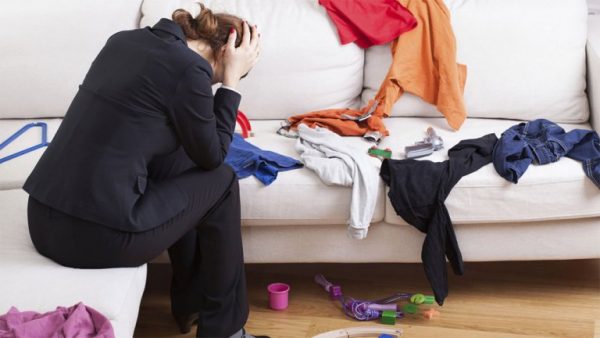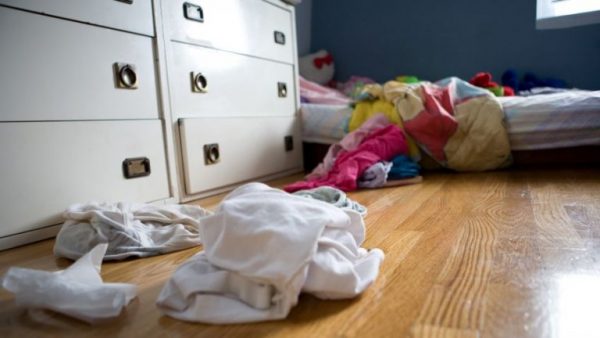The Fear that Hides behind Untidiness

There are a whole set of fears that hide behind the clutter. Neglecting tidiness is much more than a lack of time or negligence. Our surroundings are actually a projection of our inner world. If this is true then our untidiness communicates a lot!
Our untidiness is nearly always associated with another phenomenon: accumulating things. When we don’t have much then it’s difficult to create a mess. On the other hand, when we accumulate several things, then it starts to take time to put them in their correct place, clean them or find a space for them where they don’t get in the way.
“Untidiness is very likely to occur because there are so many forms of disorder.”
-Murray Gell-Mann-
At the same time, without realizing it, we tend to create the clutter only in certain areas of the house. This also means something. It’s almost always related to some form of fear. We’re going to have a look at the fears that are hidden behind the mess. First of all though, we’ll examine the phenomenon of accumulation.
Different types of accumulation
Accumulation is the first step towards untidiness. It seems trivial, but in reality it is a very telling expression of what we have inside us. It is said that there are basically two types of accumulation: the old and the current.

The old accumulation has to do with all those objects that, supposedly, are very valuable to us. That is why we have decided to keep them, even though we sometimes don’t have anywhere to put them. When the objects go back a long time, we end up keeping them even though they have no great value. They might even be rubbish, but we still consider them of value.
Current accumulation, on the other hand, refers to everyday objects that we use, but which we don’t return to their proper place again. Clothes, toiletries, toys, papers, or anything that we take from their place and then don’t put them back. We can’t find the time to organize them, and just make piles of things.
Both types of accumulation also reflect those fears hidden behind the mess. In the case of the old accumulation, it has to do with the fear of letting go of the past. There is fear of accepting the new, and the old and it makes us feel nice and safe. In current accumulation, it means that we dislike something that is happening in the present and that we are afraid to face.
The fears that hide behind the untidiness
As we explained earlier, the places with the most clutter speak about the fears that are hidden behind the untidiness. It isn’t the same having lots of clutter in the kitchen as having it in the living room.

Let’s see the main meanings behind them:
- The untidiness in the kitchen speaks of emotional fragility or resentments that are not overcome.
- When the mess accumulates behind the doors, it means that there is a fear of being rejected by others, or that there is a feeling of being watched.
- If the untidiness is at the entrance of the house, it means that there is fear of relating to others.
- When there are too many objects stacked in the garage, it implies fear of the new.
- A mess in the corridors speaks of difficulties in communicating what is thought and felt.
- When there is disorganization in the dining room, it means that the family exerts too much influence and wants to control its members.
- Untidiness in the whole house speaks about apathy, anger at life and laziness towards oneself.
- Disorganized objects in the room mean fear and refusal to establish relationships with others, or to open up to the world.
Other untidy places
If a relationship between untidiness and fear is established, it is because, in this case, the objects fulfill the role of a smoke curtain, or a barrier that seeks to conceal. What are they hiding? Fear. Disorganization shows that they want to hide, or lose sight of something.
Other fears that hide behind the mess are to do with the furniture. If you accumulate and cause clutter on your desk or workspace, this shows hidden frustration and a desire to control everything. If everything is hidden under the furniture, it means we fear the opinion of others.

Apart from any meanings they may have, the truth is that constant untidiness is something that can become an obstacle. It is good, from time to time, to detach ourselves from what can be left behind. It’s also good for us to periodically clear our personal spaces. Going through life lighter is far better, and means we should be getting rid of everything that makes mobility difficult, both physical and emotional.
There are a whole set of fears that hide behind the clutter. Neglecting tidiness is much more than a lack of time or negligence. Our surroundings are actually a projection of our inner world. If this is true then our untidiness communicates a lot!
Our untidiness is nearly always associated with another phenomenon: accumulating things. When we don’t have much then it’s difficult to create a mess. On the other hand, when we accumulate several things, then it starts to take time to put them in their correct place, clean them or find a space for them where they don’t get in the way.
“Untidiness is very likely to occur because there are so many forms of disorder.”
-Murray Gell-Mann-
At the same time, without realizing it, we tend to create the clutter only in certain areas of the house. This also means something. It’s almost always related to some form of fear. We’re going to have a look at the fears that are hidden behind the mess. First of all though, we’ll examine the phenomenon of accumulation.
Different types of accumulation
Accumulation is the first step towards untidiness. It seems trivial, but in reality it is a very telling expression of what we have inside us. It is said that there are basically two types of accumulation: the old and the current.

The old accumulation has to do with all those objects that, supposedly, are very valuable to us. That is why we have decided to keep them, even though we sometimes don’t have anywhere to put them. When the objects go back a long time, we end up keeping them even though they have no great value. They might even be rubbish, but we still consider them of value.
Current accumulation, on the other hand, refers to everyday objects that we use, but which we don’t return to their proper place again. Clothes, toiletries, toys, papers, or anything that we take from their place and then don’t put them back. We can’t find the time to organize them, and just make piles of things.
Both types of accumulation also reflect those fears hidden behind the mess. In the case of the old accumulation, it has to do with the fear of letting go of the past. There is fear of accepting the new, and the old and it makes us feel nice and safe. In current accumulation, it means that we dislike something that is happening in the present and that we are afraid to face.
The fears that hide behind the untidiness
As we explained earlier, the places with the most clutter speak about the fears that are hidden behind the untidiness. It isn’t the same having lots of clutter in the kitchen as having it in the living room.

Let’s see the main meanings behind them:
- The untidiness in the kitchen speaks of emotional fragility or resentments that are not overcome.
- When the mess accumulates behind the doors, it means that there is a fear of being rejected by others, or that there is a feeling of being watched.
- If the untidiness is at the entrance of the house, it means that there is fear of relating to others.
- When there are too many objects stacked in the garage, it implies fear of the new.
- A mess in the corridors speaks of difficulties in communicating what is thought and felt.
- When there is disorganization in the dining room, it means that the family exerts too much influence and wants to control its members.
- Untidiness in the whole house speaks about apathy, anger at life and laziness towards oneself.
- Disorganized objects in the room mean fear and refusal to establish relationships with others, or to open up to the world.
Other untidy places
If a relationship between untidiness and fear is established, it is because, in this case, the objects fulfill the role of a smoke curtain, or a barrier that seeks to conceal. What are they hiding? Fear. Disorganization shows that they want to hide, or lose sight of something.
Other fears that hide behind the mess are to do with the furniture. If you accumulate and cause clutter on your desk or workspace, this shows hidden frustration and a desire to control everything. If everything is hidden under the furniture, it means we fear the opinion of others.

Apart from any meanings they may have, the truth is that constant untidiness is something that can become an obstacle. It is good, from time to time, to detach ourselves from what can be left behind. It’s also good for us to periodically clear our personal spaces. Going through life lighter is far better, and means we should be getting rid of everything that makes mobility difficult, both physical and emotional.
This text is provided for informational purposes only and does not replace consultation with a professional. If in doubt, consult your specialist.







